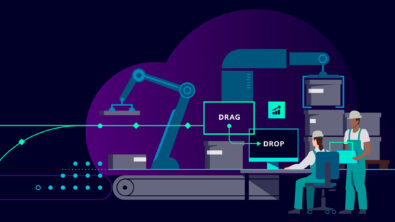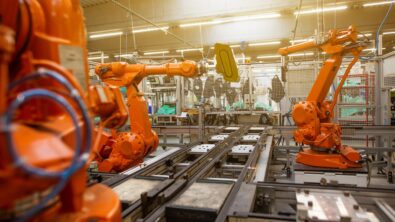Enabling low-code development with AI Transcript – Part 3

Bringing AI to everyone is no easy task but in a recent podcast, Subba Rao, Director of Manufacturing Industries Cloud for Mendix, explains how they working to achieve just that using AI itself. Click here to listen to the episode, or read along with the transcript below.
Spencer Acain: Hello, and welcome to the AI Spectrum Podcast. I’m your host, Spencer Acain. In this series, we explore a wide range of AI topics from all across Siemens and how they apply to different technologies. Today, I’m joined once more by Subba Rao, Director of Manufacturing Industries Cloud for Mendix, and now continuing our discussion from the previous two episodes. Are there any major benefits of bringing AI to the platform like Mendix? What are some of the major challenges you’ve faced to achieve even what you’ve got so far?
Subba Rao: First thing, that’s a good question. First is by bringing all this to Mendix, all the AI-related capabilities, whether it is AI assistance or augmenting AI into your applications, making the applications more smarter. The key is democratization. So when I say democratization, it is not just democratization of application usage and application development, but democratization of data is becoming more practical now. So what I mean by that? Let’s take an example of chat GPT, which is like, previously lucky, we used to call search, search became, okay, did you Google it? So it became anonymous between search and Google. So now chat GPT is becoming more and more anonymous for any of the generative AI topics. So ChatGPT, if you look at it historically, it’s kind of like in even though GPT was released in 2018, its popularity became more and more once the GPT-3 is released in 20, 22, if I remember right. In November 2022, they released it with a user experience that made it much easier. Why it became so popular? So if you just slice it, right, of course, there are several advancements that happened from GPT-1 to GPT-3 and now GPT-4-0, right, a lot of advancements in the underlying language models and all the trainings that have gone with it, right. But the accessibility of that to the common person has made it so popular and it became like a word in everybody’s mouth, right. So what I mean by that accessibility is that simple user experience, intuitive user experience, if you go to chat GPT and then just like user experience is so simple, you just ask anything, you get a response, now you can talk to it and you get like a response, right. So that is what like made it more powerful. If you take it into the industrial context, that is what we are seeing, right. And this is where like with so much data that is there in the industrial context, obviously within the form like within their organizational boundaries, right. Making it more accessible, making it more consumable with the intuitive user experience is where the power of the data can be leveraged. And this is what like we see from medics perspective along with the Siemens Accelerator portfolio in industrial context, right. Bringing value to our customers in terms of like democratization of the data and also democratization of application across the domains, whether it might be engineering, it might be manufacturing quality or it might be supply chain, right. You don’t need to be an expert in it, but you need to be able to kind of like slice the data and make the meaningful decisions in the timely manner.
Spencer Acain: I see. So kind of to change topics slightly a little here, you mentioned Mendix democratizing industrial AI. So what do you mean by that?
Subba Rao: So in simple terms, just to kind of like expand on what I said earlier, right, making industrial data accessible to all within the organization. So that is the key when I say democratization of data and the industrial AI. Obviously within industrial context, there are a lot of security rules, a lot of like constraints that needs to be honored. And within those boundaries, that’s what like medics empowers the organization to make it easier via like AI enabled applications, obviously with AI assistance and AI augmentation to any role within the organizations. So what I mean by that any role is, as I mentioned earlier, don’t have to be an IT expert. You might be day to day like a production supervisor or the manufacturing plant manager or you might be a supply chain like within the supply chain domain, working with your suppliers and vendors, negotiating prizes, looking at the suppliers or even you might be on the engineering side working on the new designs or even like collaborating with your suppliers in terms of make versus buy decisions, looking at all the different parameters and risk aspects, right. So to get to solve this complexity to kind of like make everybody engaged in their processes and also create a collaboration, right, AI makes a place a key role and Mendix like by having these capabilities of AI assistance to build the applications faster, by having capabilities of AI augmentation where everybody in the organization can have smarter applications leveraging these capabilities. So that’s what we call like democratization of data and industrial AI. I’d say that sounds like a really valuable thing to have. I mean, you’re basically allowing anybody who has an idea or has an or my benefit from interacting with AI to be able to do so without becoming an AI expert themselves. That is true. And the key thing is like data science, like we hear like it’s a complex thing. We see that it’s a complex thing because of all the data correlations, right. You don’t need to be a data expert or some data scientist to use AI. And that’s that’s what we hear from our customers as well, especially in the manufacturing context, right. We don’t expect everybody to be a data scientist. You don’t want everybody to be data scientist as well. There are domains there are experts in those domains. They are like very focused and achieving their goals within their data activities as well. Along with giving them the bigger value to the organization. And this is kind of like the key for them to empower the workforce, empower the organization, everybody in the organization to be kind of like a leverage of these capabilities equally, whether you are expert data science. Yes, that’s good. If not, you should be able to maximize the potential of AI into your data processes. And your cross domain collaborations.
Spencer Acain: Yeah, absolutely. So I guess to return kind of to our topic of the AI applications within Mendix. So how do you see Mendix as a platform expanding in the future, especially in kind of the context of adding more or refining more your artificial intelligence and machine learning applications and approaches?
Subba Rao: Yeah. So few things means like so far we have been talking about Mendix as a local platform. But Mendix is a Siemens business. So we want to create value to our customers of how they can use local in the Siemens accelerator context. So our mission is to make our customers help our customers build AI enabled applications with ease, right? Where Mendix is the low code enabler for Siemens accelerator digital business platform. So whether you are using team center or sim center or op center or industrial edge or any of our Siemens accelerator portfolio. And you should be able to like access the data from those systems, augment those systems, connect the processes and leverage AI as well. Whether it might be AI models or machine learning or generative AI. And it’s not only with the Siemens accelerator, but with also with our ecosystem partners. Earlier I talked about like our ecosystem partners like AWS or like open AI, Microsoft or Google side. So combination is where we kind of like as a mission in the future. You will see all these things coming together and making it easier for customers in the industrial space to build applications. That can to leverage the AI in the right way within the context of their data and the systems that are coming from Siemens accelerator or ecosystem partners. So the goal is making the connectivity easier across Siemens accelerator portfolio as being low like Mendix being the low code enabler for Siemens accelerator to provide the contextualized data inside all powered by AI. I see. So I mean that sounds like a great application or a great goal to strive for, great goals to to prevent their you know over time. But I guess as we kind of draw to an end here, is there anything else interesting you’d like to share either you know about your work or about AI in general? Yeah, I mean it’s like just as a closing comments is AI is transforming everything. Like being in this space for 28 years. So I see like okay that there are a lot of like isolated projects about AI or machine learning in the industrial space right. But now it is transforming and predominantly obviously from our work life we are seeing that we’ll see with our next generations getting more and more into this AI driven everything will become like AI. But if you pivot to the industrial space across all these digital initiatives that are going to reap the benefits from AI. One thing organizations they acknowledge it and then it to strive for this is think data data and data. So without data you cannot apply any AI you cannot reap the benefits from AI. So irrespective of the maturity because every organization is a different maturity level in terms of their like technologies whether it might be information technologies or operational technologies on the shop floor. Thinking data first making your mindset as like okay data driven and taking steps to overcome the hidden data challenges every organization has hidden data that is kind of like either with manual processes in isolated processes that are not connected harmonizing that is the first step. Even though there are like several like core systems core investments that are done in the PLM systems or ERPs or manufacturing excursion systems or supply chain systems right. There is still some hidden data there are still some manual processes there are still some paper like legacy systems that are not connected. So creating a path creating the journey is very critical to get the data and digital maturity. So as you kind of like my last statement in this one is as the organizations are creating this digital initiative start looking at this as a journey to make the digital maturity and data maturity more and more harmonized and remove the hidden data complexities and that’s when the power of AI and engaging your workforce becomes more and more practical. Otherwise it will just become like a one isolation proof of concept of pilot activity you will not be able to scale it.
Spencer Acain: Yeah I mean definitely couldn’t agree more you know it’s all about that data right but I think that’s all the time we have for this episode. So I would like to thank you Suba for joining me here today and giving your wonderful insights on AI.
Subba Rao: Thanks Spencer and glad to be joining this podcast with you.
Spencer Acain: Once again I have been your host Spencer Acain and this has been the AI Spectrum podcast. Thank you for tuning in and catch you all in the next episode.
Siemens Digital Industries Software helps organizations of all sizes digitally transform using software, hardware and services from the Siemens Xcelerator business platform. Siemens’ software and the comprehensive digital twin enable companies to optimize their design, engineering and manufacturing processes to turn today’s ideas into the sustainable products of the future. From chips to entire systems, from product to process, across all industries. Siemens Digital Industries Software – Accelerating transformation.


